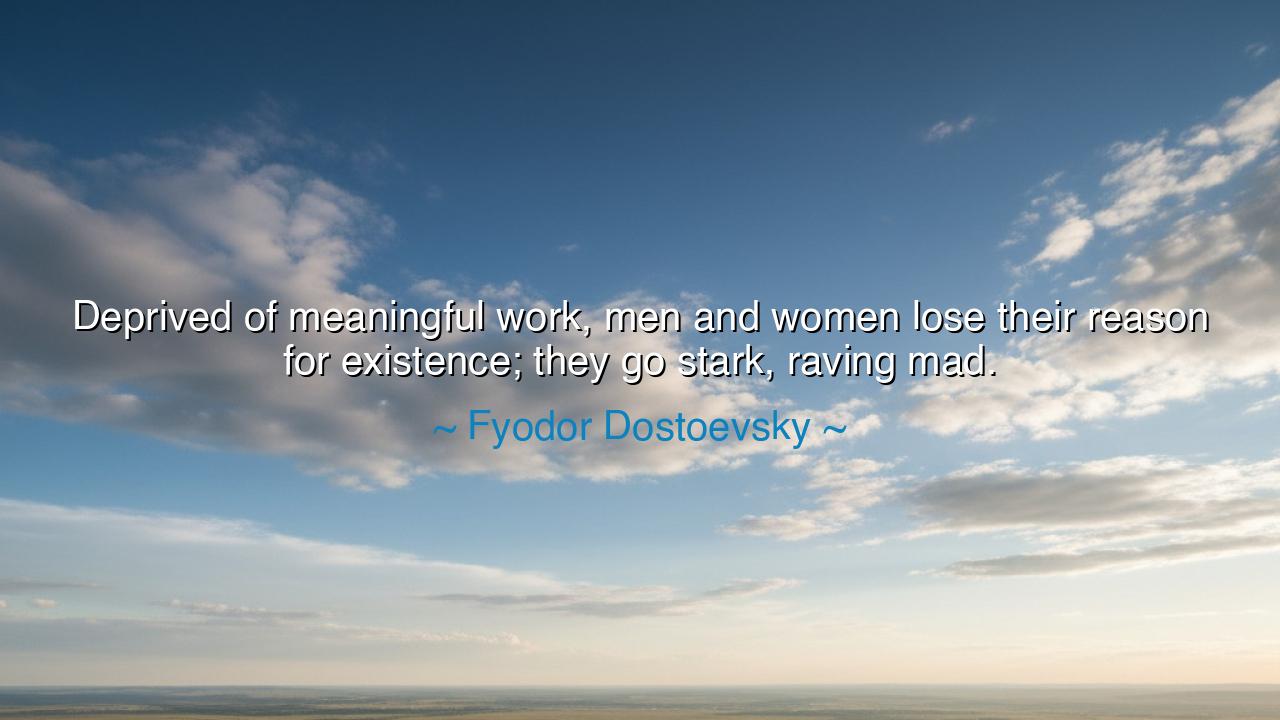
Deprived of meaningful work, men and women lose their reason for
Deprived of meaningful work, men and women lose their reason for existence; they go stark, raving mad.






Hear the voice of Fyodor Dostoevsky, prophet of the human soul, who wrote with burning conviction: “Deprived of meaningful work, men and women lose their reason for existence; they go stark, raving mad.” These words rise from the depths of his suffering and his witness to the suffering of others. They are not spoken lightly, but as testimony: for Dostoevsky himself endured imprisonment, labor camps, and the cruel stripping away of human dignity. He knew that without purpose, the spirit begins to rot, and madness creeps into the corners of the mind.
The meaning is fierce and clear. Meaningful work is not merely toil for bread, nor the endless repetition of tasks that drain but do not inspire. It is the sense that one’s labor contributes to life, that one’s hands and heart are building something greater than themselves. When men and women are cut off from this sacred task—when they are reduced to idleness or to labor stripped of dignity—they wither. Their reason for existence falters, for the human being was not made to drift like a dead leaf, but to grow, to create, and to serve.
The origin of these words lies in Dostoevsky’s own ordeal in the Siberian prison camps, where convicts were forced into meaningless work—digging trenches only to fill them back in again, carrying rocks from one place to another without purpose. This cruelty was not punishment of the body alone, but a deliberate assault on the soul. For when work is emptied of meaning, it becomes torture; when life is emptied of purpose, it becomes despair. Thus, he saw with his own eyes how men, stripped of meaningful labor, drifted into madness, violence, or numbness of spirit.
History too gives us examples of this truth. Recall the Great Depression, when millions were cast into idleness against their will. It was not hunger alone that crushed them, but the loss of dignity and purpose. Men who had once tilled fields or built homes sat aimless on curbs, broken not only by poverty but by the absence of meaningful contribution. In contrast, when governments created programs of work—bridges, roads, schools—the people revived. Food filled the belly, but purpose filled the soul.
The lesson is not only for nations, but for each of us. To live without meaningful work—whether of the hand, the mind, or the heart—is to drift toward madness. It is not wealth that sustains the human spirit, but purpose. One may endure hardship, deprivation, even chains, so long as the work carries meaning. But to be cast into a life where one’s labor has no value, or where one’s gifts find no outlet, is a torment far greater than hunger.
Therefore, children of tomorrow, do not measure your lives only by ease or comfort. Seek always for meaning in your labor, for in this lies the root of joy. Whether you build a home, raise a child, write a poem, or heal a wound, let your work serve life beyond yourself. And if ever your labor feels empty, search for ways to kindle purpose within it—find the people it helps, the order it creates, the beauty it sustains. For even small tasks, when linked to meaning, can save the soul from despair.
Practical action flows from this wisdom. Ask yourself each day: does my work give life to others, or only drain my own? If it is the latter, seek not escape into idleness, but transformation—find or create labor that nourishes the spirit. And when you encounter others stripped of purpose—whether unemployed, forgotten, or silenced—remember Dostoevsky’s warning: they stand at the edge of madness. Offer them opportunity, dignity, and a place where their hands and hearts can serve.
Take this truth as a guiding flame: the human being cannot live on bread alone, nor on comfort, nor on wealth. Without meaningful work, the soul crumbles, the mind unravels, and life becomes unbearable. But with it, even in prison, even in hardship, one may endure, rise, and even rejoice. For purpose is the true breath of the spirit, and those who labor with meaning carry within them the strength to withstand the storms of existence.






AAdministratorAdministrator
Welcome, honored guests. Please leave a comment, we will respond soon